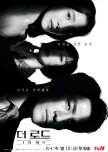
It´s opaque and rather gloomy, venturing to juggle shadow rather than light
"The Road: The Tragedy of One" is based on a (Japanese) novella by Rintaro Norizuki with its spotlight on the higher end of high society. The KDrama "Mine" from the same production year, which is located in a comparable segment at the top of the social pyramid, chose rich bright colors and extravagantly shimmering robes amidst glitz and glamor as the backdrop for a study on decadence and greed. In contrast, the TV production "The Road: The Tragedy of One" makes no attempt whatsoever to immerse human abysses in a colorful light that is somehow aimable and pleasently digestibility. No. This KDrama has a rather gloomy side to it. It´s opaque. Outrageous.You may vainly search for anything virtuous here. Let alone family values, especially when it comes to raising children. People mysteriously die. There is crime. Corruption. Affairs. Cowardice. Selfishness. There is (almost) nothing left of high moral standards. The series is heavy opera. Yet, excellently casted throughout. Everyone is doing their best. Still, whatsoever, it's not nice to look at. If the human ugliness is shown all too ruthlessly... who should one identify with? You have to delve far into your own abysses to sympathize and feel with the protagonists... (maybe one of the reasons, why the viewer ratings aren´t quite balanced to the true quality of the show...)
In any case, the KDrama is thrilling in its own pace and style. There are plenty of secrets throughout. You get Makjang, too ... obviously it can always get worse... (KDrama somehow always is great at drama!) It's opaque up to the end. The story takes its time to unravel the tangled threads. The screenplay is particularly atmospheric. Eventually, more of a trip into darkness. Literally (i.e. optically), too. I would call it an experiment in the latest KDrama Orbit, that dares to juggle shadow rather than light and ventures to tell a story without wholesome, easily digestible sweets.
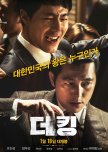
A man and his personal story of greed - leading into the repulsive quagmire of a corrupt network
In 2017, "The King" is among the top ten movies in South Korea. The story is a prototypical example for a few extremely powerful men(!) manipulating crime, business & politics within South Korean society. In an idiosyncratic style, the movie conveys an insight into an repulsive quagmire of corrupt networks that run through all social classes. It is about the particular imbalance in the realms of public prosecutors and judiciary, which in the 1990s and 2000s was still massively determined by bribery.The protagonist tells his personal story of greed (it is always people behind a system...) This is about his climbing to the top and the correspondingly deep fall. He accompanies the events from the off while the story unfolds before the eyes of the viewer in trenchant, impressive scenes. At first, you have to get used to this particular style, but the acting, pace, rhythm and camera nimbly catch the audience by the hand and won't let go until the end.

Although ´makjang´ was taking it almost over the edge of the bearable, I had to stick with it
A classic among KDramas. The dramaturgical moves may sometimes be predictable - the evil stepmother and such... However, there is this passionate play of truly dedicated actors . ...and a groovy interpretation of Ave Maria, that burns mercilessly into your heart and ear. Although makjang (Mean! Bitchy! Malicicious!) was taking it almost over the edge of the bearable, I had to stick with it. Some scenes still have an impact on me years later.Human abysses are presented in abundance. In addition, dealing with different facets of true love. An unforgettable piece of KDrama, for those who can never get enough drama. Here you can emotionally let off steam on the backs of the protagonists. For everyone else it might be a bit too much in some places.
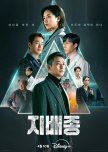
Crisp and tasty KDrama - revolving around some hot topics that one might rather want to call sci-fi
Intelligent, sharp, with strong characters. A crisp and tasty KDrama. “Blood Free” got me immediately - with an original hook, set within a gripping milieu, topped by thoughtful demeanor of interestingly authentic protagonists and splendid casting.Of course, the interfering natural interest of those in power (who obviously can never keep their hands off) is not at all surprising. Yet, the processing of some rather hot contemporary issues was presented in a refreshingly concise manner. Including topics that one might call a dream of the future... A bit far-fetched here and there? Perhaps. Nevertheless, often enough well grounded in common sense.
I assume there could as well be a second season... because the end doesn´t necessarily have to be the end, does it?
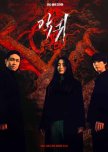
If you´re ready for what lies beyond the obvious & don´t mind a gloomy scenario, go for it
For those who don't blench from paranormal dimensions, "Revenant" is certainly a must-see KDrama. Pretty much everything is done right here. "Revenant" is a crime thriller that transcends time and space, embracing a world that is more than meets the eye and the rational mind. “Revenant” also belongs to the genre of supernatural, even horror-mystery productions. However, to reduce it to that would not do justice to this KDrama.Demons, ghosts of the deceased, people who can see such entities, and people possessed by these entities are all traditionally deeply rooted in South Korean culture. Folk religion and shamanism are still present today – sometimes more, sometimes less, sometimes not at all relevant to the individual, yet nevertheless present. "Revenant" is deeply rooted within this national culture, with Shamanistic rituals being explicitly involved here. In the mass consciousness, the supernatural world has retained a firm place over the millennia. "Revenant" specifically refers to that, (unfortunately without going into detail regarding its backgrounds.) In that sense, "Revenant" is not an unusual SBS-KDrama production for the South Korean audience. At the same time via Disney+ Streaming-Platform this series is exporting a piece of its rich national culture across the border, too - superficial as it as such may remain.
In "Revenant" Kim Tae-ri and Oh Jung-se, however, show high-end performance. Actually overall, this KDrama is in general characterized by its great casting. The acting alone makes it worth seeing. The story is unpredictable and complex, so are the relationships. Additionally, it draws from the long tradition of South Korean folk beliefs, ingeniously mixing it with a modern, rather scientific, investigative approach.
Be prepared for a suspenseful plot. The attraction of "Revenant" lies in the dramaturgically intelligent and fascinatingly presented interweaving of crime thriller and multidimensionality of being. It is obscure, too. In “Revenant” people are possessed by ghosts of the deceased, who are acting in an almost criminal manner. With conventional police investigation, murder executed by such astral beings, who materialize their intentions through their mental occupation of human bodies, are difficult to uncover.
Should you watch it? If your are ready for what lies beyond the obvious, yes. If you don´t mind a gloomy scenario, yes. It is different from your ordinary KDrama, though.
PS:
For me, however, "Revenant" is not just another highlight in a KDrama tradition that is rather fearless regarding the paranormal. The production is also one of a noticeable number of KDramas, that transcend time and space as well as this world and the afterlife, which are increasingly flooding the screens. (Especially in 2023 with i.e. "Island", "My Perfect Stranger", "See you in my 19th Life", "Heartbeat", "Durian's Affair", "Miraculous Brother" … and the year is not over yet). Ghosts, demons, reincarnations, time travel, you name it – the worlds overlap and mix, with time and space having become relative. The curtains between different dimensions are increasingly lifted. The paranormal is becoming more and more normal in the worldwide mass consciousness. Multidimensionality is a topic that people obviously increasingly like to deal with. It isn´t necessarily horrifying anymore. Not in South Korea, nor elsewhere on this planet.
In general, I find that quite inspiring, since dealing with multidimensional spaces, times and beings, has a potential to opening up new perspectives towards life. (Even if it may not all be logically satisfying yet.) It is offering a potential towards a more conscious appreciation of what makes us being human, too.
PPS:
One appealing, even salutary message that "Revenant" (somewhere along the line) would have to offer: the 'evil' intentions of the astral beings can only be as evil as the human 'hosts' allow. At some point the human has to give his or her 'Ok'. If a person has no resentment or greed and is at peace with the world, then there is not much harm wandering ghosts or astral beings in the near-earth realms can do. That would be good news, wouldn´t it... yet… compared to ghosts, eventually human beings can easily be the more frightening creatures here...

The KMovie is carefree, harmless and heartily. However, it is not trivial.
"Dream" is about team spirit as a positive force that allows a group to excel itself. The KMovie is carefree, harmless and heartily. However, it is not trivial, as it sides with those commonly referred to in society as the weak.You shouldn't expect too much, then everything works quite well. Obviously, IU and Park So-joon are the show's carthorses. But that doesn't do justice to the rest of the cast, who all contribute their unique esprit. “Dream” comes across as teamwork through and through.
Although it was filmed at original locations in Budapest, somehow, in my opinion, the casting (unfortunately) often enough doesn't work so well, when Korean productions are dependent on actors from different origin. For whatever reason. Even if it's only supporting roles or extras in this case, they seem to be rather amateurish. Hm.
All in all: “Dream” is a KMovie for high spirits and light fare. Not intrusive. With a few flaws here and there. However, also with some well-placed, wonderful and valuable messages in passing.
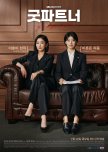
About "good" partners in various senses. A pleasantly vivid and complex, well-rounded story.
“Good Partner” is about lawyer and divorce cases, while radiating quite some ´work life in Seoul´ feeling. The main focus obviously is on divorce and everything that comes with it. In South Korea so far, divorce has been an issue ´non grata´ sort of. But it has become quite hot recently. Being able to deliberately elaborating this topic in a KDrama is due to exploding divorce rates. Even the older generation is increasingly daring to take measures by leaving the unhappy marriage behind and finally daring to make a new start. Of course, separation is never easy and becomes even more complicated as children are involved. “Good Partner” tackles the hot topic fearlessly. Additionally, some still questionable legal issues surrounding divorce are mercilessly brought to light, as are the notorious cheaters and the tragic, far too frequent cases of misogynistic, domestic violence.“Good Partner” also deals with the rigid chains of command, often enough turning lawyers in large law firms into mere underlings. On the other hand, the KDrama also confronts the question of the right dose of sense of morality, distance or even abstinence one should/must/may/want to emotionally attach to the cases. Furthermore, "Good Partner" also confronts the closed-meshed career culture in everyday office life, where employees can quickly lose themselves while living up to expectations. Work-Life-Balance ist still a fairly new concept. And last but not least, a critical swipe at the unfairly privileged “elite” (= “we have special status and are allowed to do everything”) should not be missing, too.
Embedded in the office world of the two protagonists, quite a lot of contemporary burning issues that currently concern and shape the lives of many people i.e. in South Korea, especially in Seoul, are carefully considered and illuminated from different sides. In doing so, the KDrama is opening up new space for contemporary approaches towards dealing with well-known life issues. A pleasantly vivid and complex, well-rounded story.
“Good Partner” feels like it gets better with each episode. This is also due to the development of the protagonists as they sincerely face their personal concepts and convictions again and again in the context of their cases (not least thanks to Han Yu Ri's untiring sense of morality)... Thus, in the long run, the KDrama is about "good" partners in various senses, not only when it comes to the female leads. However, together those two are creating a pleasant breeze of sisterhood, one that feels particularly good in the midst of a predominantly patriarchal world.
All of this makes “Good Partner” a deserved success. TV audience in the country more than doubled over the course of the 16 episodes. Understandably so. I can definitely recommend this series.
PS:
PLEASE do yourself a favor and give episode “0” a wide berth!!
It's a complete aberration and has nothing to do with the actual KDrama, except that someone apparently got bored during the temporary broadcast break during the 2024 Summer Olympics... You can definitely ignore that one, believe me.
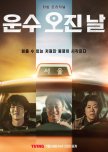
Absorbing & intense 500 minute road movie. A taxi ride to a soul´s nowhere. Brilliant from A-Z.
For me, “A Bloody Lucky Day” is one of the KDrama highlights of 2023.It is a psychological thriller. Without makeup. Set in a fairly grounded, solid, authentic everyday world, which gets challenged by a maniac´s incredible psychological logic. Stirring. Brilliant from A-Z.
However, everything revolves around the abysmal work of a psychopath. Accordingly, things get mercilessly brutal at times. The cumbersome police don't come off so well. Common sense, on the other hand, does... when it is in fact emotionally cornered to the extreme, so that it can no longer help but function at full speed, without distraction whatsoever.
One-pointed concentration, already having lost too much, getting your teeth into it and being ready to go to extremes – could that be the recipe to counteract the psychopathic 'monster'? Could... Maybe... Or not... Or is it?
“A Bloody Lucky Day” could be considered an absorbing ca. 500 minutes long road movie - a taxi ride to a soul´s nowhere. For the poor taxi driver a rather involuntary participant observation study on a psychopathic killer...
Emotionally highly explosive. Intense. Acting is first league. As a I mentioned earlier, a brilliant production from A to Z.
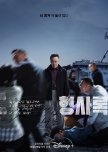
Solid crime drama! Gripping! About an aged, cynical cop struggling in a dark, grim man's world
"Shadow Detective" offers solid crime thriller quality at a high level - gripping, dense, with South Korean Look&Feel!As a Disney production, the series was produced explicitly for the international streaming audience. Accordingly, within compact 8 episodes the KDrama presents itself rather slim in terms of some characteristic dramaturgical, Korean-style storytelling elements. Nevertheless, a profound script, the committed cast and witty camera manage to create an enormous intensity and three-dimensionality.
"Shadow Detective" takes the audience firmly by the hand. The story does not have to come up with an excess of violence (as is so often the case with international, more masculine orientated streaming productions). I should mention, though, that it's primarily about older men in a man's world - and it's rather dark, grim, cynical.
Against the almost self-evident background of an almost unassailable, corrupt shadow world, the story focuses on the protagonist's inner struggle to do a reasonably good job as a detective despite the ailing system (... and to cope with aging).
Another season has already been announced.
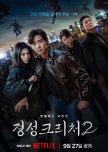
The back-up story would have been there, but the willingness to actually tell it was limited
So here it is, the second season. The historical coat is stripped away and the story transforms into a modern thriller, the theme of which revolves around a horror that only humans are capable of.Pleasing and pithy: Some script scenes from the first season were hinted at and entertainingly mirrored in the present day mise-en-scene. That´s fun to watch. The confrontation with the longing for power and immortality also has its moments and insights. Additionally: the leads give their all, again.
On the other hand, someone in production probably didn't really feel like it anymore... There is only minimalist suggestion of what may have happened during the past 80 years. This could actually be a substantial story, yet they are not going to tell us. This serves merely for shaping a coarse (albeit promising) framework, unfortunately remaining pretty lean. Thus it is raising more questions than it feels like answering, its only mission being turning the two leads though the mill of horror once more. Accordingly, the story almost constantly takes place in gloomy night, dark rooms or sinister underground.
For season 1, the dramaturgical technique of hinting at historically shaped, individual fates may have had an effect, enhancing identification with characters. For the second season, continuing with this method only works to a limited extent, because by now we are already closely identified with them.
All in all, the second season comes across somewhat indecisive. The back-up story would have been there, but the willingness to actually tell it was limited. On the other hand, it is still fast-paced and emotionally dense. Nevertheless (at least for me) it is somehow unsatisfying, almost unnecessary. Second seasons for Netflix-KDramas haven´t really convinced me yet. Neither does this one.
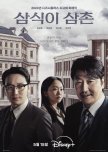
Great performance & complex narrative re. challenges in politics during dreary SK post-war decades
"Uncle Samsik" offers a quite interesting narrative of the complex connections between party politics and the even more crucial backroom politics during South Korea's first republic (1948-1960). The KDrama is primarily set in the run-up to the turbulent events and nationwide demonstrations that led to the resignation of the first President Rhee and the founding of the second republic. However, the nation that had hoped for real democracy and prosperity stumbled into a third one just three years later through a military coup. Although this brought the hoped for prosperity via totalitarian capitalism, it was still far from real democracy...The story of the KDrama is based on historical events, themes and people of that time, but is ultimately fictional - even if historical film sequences are occasionally interspersed as part of the April Revolution. The focus is on Uncle Samsik. For all those, who don't know much about South Korean history, Uncle Samsik is the emotional reference figure and dramaturgical bridge that holds all the politically complex threads together. Even without prior knowledge, "Uncle Samsik" offers an exciting, haunting political drama that takes place in the post-war years. It is in particular thanks to the passion of the great actors who manage to captivate the audience with comparatively 'dry' fare. It is advisable to watch the episodes consecutively so as not to lose the thread.
With a fictional plot the well-known historic events and what actually drove the political actors of that time are portrayed from different perspectives. Thus they are shown as multifaceted people with complex motives and stories. Political calculation becomes tangible through relationship dynamics and formative personal experiences. What created the conditions for that dictatorial regime and its totalitarian capitalism to torpedo South Korea into dazzling prosperity - the needs, hopes, ideals and concerns underlying the political actors - are being filled with life. And at the same time also what the young democracy still has to gnaw at today - authoritarian directive, opaquely networked and strictly hierarchically structured backroom politics.
The time in which the KDrama is set is marking the initial struggle to set the course for 'right' politics and a democratic political culture to start with. You have to keep in mind that Korea has not yet been able to gain much experience with modern, international politics and economic policy on the world market. Until the end of the 19th century, the Joseon Kingdom had isolated itself from the rest of the world and concentrated on itself. Western modernity and international influences increased during the early 20th century, especially while the Korean peninsula was a colony of Japan. The guidelines for political autonomy and independent parliamentary politics were only set in the course of the founding of the Republic of Korea as South Korea in 1948. And even then, the USA kept a close eye on the young republic. The people in South Korea had not yet been able to seriously experience themselves as political mature people of a democratic country... The south, by now isolated from its rich in raw material and industrially well developed north, was at that time one of the poorest agricultural countries in the world.
Uncle Samsik vividly depicts the conflicting feelings in the country. He represents the prevailing longing for wealth... or simply for three meals a day. Uncle Samsik's nickname already reflects what he stands for: sam (eum)sik = three meals. He (as a good uncle) grants this to his people. So actually this very basic human need was the top priority in those politically turbulent years. Hunger and poverty shaped everyday life for the many. Democracy as a political ideal may sound good, but it doesn't fill your stomach. Samsik cares about people. His political goal is to use all possible means to support those politicians who have a solid concept and can bring the country to a point where the people will soon have enough to eat. The way to get there: to consistently boost the economic power of the economically weak country (compared to the north) and thus create appropriately paid work whose salary is enough to provide for the families... even if that might imply that the people´s hope for true democracy still has to wait a bit longer...
So would I recommend "Uncle Samsik"?
Yes, but...
It's one of those things with historical dramas that deal with Korea´s recent post-war history (and with the KMovies about the first post-war decades, too... you have to want to see it. Colours, light, selection of protagonists - this is often enough inevitably not a treat. Colorful robes that were still common in Joseon times are rarely seen anymore. After the Japanese colonial period and at least since the influence of the USA in the wake of the Korean War, fashion has been completely westernized. This makes the production design comparatively rather dreary - dark suits, ties and plenty of scenes inside or in the dark. It is about scenes inside offices, hotel bars, conference rooms and bunkers instead of lushly planted palace gardens, picturesque bridges, colorful pavilions and pagodas, or the shaded, meditative palace walkways - it's all history. Politics by now happens behind closed doors. If suitable, it might sooner or later end up on the streets, too. Female characters with impact are also rare - gone are the lively days of palace ladies, servants and princesses, scheming dowagers and queens or spying gisaeng... Instead, there are lots of serious men in their (as I mentioned before) dark suits, preferably smoking and debating or giving orders in back rooms. Politics is a man's business - a power struggle that is eventually resolved with the help of thugs and cloak-and-dagger operations... (After all, women's power is at least trying to carve out some space in "Uncle Samsik"...)
In short, the setting is rather dark, complex, even complicated - and ties-heavy. Be aware.
Apart from that, "Uncle Samsik" is really well done. Vividly played and thematically differentiated, the KDrama brings those dreary, sobering post-war decades in South Korea to the international DisneyPlus audience, presenting it as a time that, despite all the prevailing corruption, arbitrariness and obedience to authority, was also characterized by a lot of idealistic passion and political hope. Once again, high-end historical drama à la KDrama...
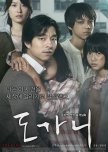
Outstanding KMovie. Daunting. Blunt. Galvanizing. Impressively staged. Yet rather painful to watch
"Silenced" is a 2011 movie production. The KMovie is based on a book and this in turn is based on a true story that happened at Gwangju Inhwa School. For a change, it's not about bullying among students, but about repeated sexual abuse by teachers and school staff against their underage wards. In this case they were also deaf."Silenced" is an outstanding, moving film production - in several respects.
The story is impressively staged.
Horrendous abuse. Repulsive in its unbelievable brutality. Blunt.
There are the children left at the mercy of pitiless adults, left alone in their helplessness - speechless in every respect. What else can they hope for in this world?
There are the adults - the perpetrators and also those who knowingly close their eyes to injustice for their own benefit. (I have no idea what they do with their ears and their conscience, though...)
And there are the two protagonists - neither of them exactly the epitome of promising heroes...
With a top-class Gong Yoo, who personally and actively supported the filming of the story. He read the book during his military service. But it was only later that he found out that these were true events. He met with the author and the idea for the film was born. He embodies the main role of the initially quiet, perhaps somewhat wimpy, indecisive teacher; a widower and a father who is absent due to his job and who relies on his mother's support to look after his sick daughter. Yet, it is precisely this tangible, silently screaming human weakness of his character, his uncertainty in dealing with the unfathomable, his own initial shock of cautious, perhaps naive reserve that contributes to the authentic strength of the KMovie. (If the world were full of determined, courageous heroes, then there would be less such terrible incidents, repeatedly taking place over the years with impunity - like those in that South Korean boarding school for the deaf in Gwangju...or that Odenwaldschule in Germany, or far too many other schools worldwide.) The heroic in our protagonist must first be born and then grow. This is a process. Step by step, stumbling, helpless, hopeful and yet again discouraged, but then unbendingly getting up again - and finally on a path of no return...
The KMovie “Silence” is shocking.
Grim. At times it may be reminiscent of a horror movie like 'The Shining' or something similar. The story is daunting. Its social dimensions are sobering. There are hardly any words for this parallel world. What people are monstrously capable of... and then also: that time and again, in the face of blatant injustice, people let themselves be bought and silenced for their own benefit.
Nevertheless, the message at the end is (I think) quite wonderful: "...it makes me think, that the reason we are fighting so hard is not to change the world, but instead to not let the world change us." Resistance takes on an encouraging new dimension that doesn't have to give in, even in the face of a Goliath. Great!
The KMovie was and is galvanizing.
“Silenced” shook up the masses in 2011 in a spectacular way. Over 4 million horrified cinemagoers saw the movie, which was number 1 on the South Korean cinema charts for three weeks in a row. The book by Gong Ji-young was storming the bestseller lists.
What the regular jurisprudence was previously unable to do was actually subsequently made possible by the pressure of the shocked masses: 1.5 months after the KMovie was first broadcast, the so-called 'Dogani Law' was passed. (Dogani = "Crucible", the title of the book and film). Since then, the new law has suspended the statute of limitations for sexual abuse of people with disabilities and for rape of minors under the age of 13.
Therefore, some of the perpetrators at that school in Gwangju who had previously gotten off with lax sentences were subsequently summoned again and sentenced to long prison terms and/or electronic ankle bracelets.
Lastly, at least THIS school was closed.
Respect!
For taking up the issue.
For not giving up and thus using other means (a movie on the big screen).
For the sensitive handling of a tough topic.
For the often extremely unpleasant, painful, however nevertheless coherent film adaptation of a fantastic script.

Slow paced. Gloomy. Solid crime thriller, set in a perhaps somewhat peculiar milieu
“The Bequeathed” is a dark and gloomy crime thriller that is set on the fringes of madness, obsession and shamanistic practices, taking place in a remote backcountry, where ordinary people have for generations been burying their dead under green burial mounds. It's not a horror story, but rather a solid, yet slow paced crime thriller, set in a perhaps somewhat peculiar milieu.There are only 6 episodes. Nevertheless, with only a little for the short time, comparatively much is revealed about a wildly mixed bouquet of different characters. A hodgepodge of astonishingly vividly drawn figures cross paths, take their space quite naturally and leave their traces with the audience. Against the background of the ongoing investigation into a series of murders, they all get the chance to clear up what they have (emotionally) left behind ... and move on.
I would not have expected this. Therefore I was positively surprised.
Authentic performance. Amazingly complex with haunting cinematic implementation. Dense. Suspenseful.
Nonetheless consistently gloomy. (It does get a little brighter towards the end though...)
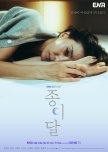
More than a remake. Delicate timbre. Powerful. Reckoning with the void of a luxury-branded world
"Pale Moon" develops a particularly delicate timbre. Fine personality portraits, none of them smooth and pore-deep clean, but rather inwardly crumpled people with dreams and weaknesses, people who sometimes make questionable decisions, who don't stick to the rules, who succumb to the temptation to take the chance to realize their dreams.A little 'noir' here and there. In any case, emotionally dense. Unexcitedly emotional. Quiet and yet powerful.
The KDrama is based on a Japanese Original (Mitsuyo Kakuta), which was successful as a series and movie, too. This is now a South Korean remake. Apparently, Kim Seo-hyung was immediately (after she saw the original in 2015) determined to play the female lead in any potential South Korean remake. You can tell, she is breathing her role.
The original novel is about the embezzlement of bank funds as actually happened in Japan. In South Korea, the list of embezzlement in billions is also long and the remake is accordingly well placed.
However, the South Korean remake is about more than misappropriation of wealth on a large scale. This is generally about lies, deceit and deception - even on a smaller, manageable, interpersonal level. However, it is also about human vulnerability, the cracks in the facade.
The story unfolds against the background of unstoppable consumption - a veritable frenzy of consumption that has long since left any connection or grounding behind. A life-style in a parallel world, that only a few can really afford. This world of luxury, which initially seems appealing, develops an intoxicating, addictive character and ultimately catapults itself into the void. What remains when the lover equips the lover with the designer goods from head to toe, from the car to the house including the interior and the laptop, too? Alert, alert: the luxurious world of matter - initially well camouflaged as the lifestyle of your dreams - becomes an ugly parasite that feeds on substantial emotions, liveliness and passion, but in the end leaves nothing behind...
In the field of tension between the dreary normality of a boring everyday life that is perhaps pimped out on the outside, but emotionally rather empty, almost everyone here is willing to deviate from the path of virtue in order to get a piece of the promisingly dazzling consumer cake.
Nevertheless, the story also tells of the sincere moments of perception and recognition of unsightly vulnerability. These are the moments when sincere encounter happens to become possible. On the outside, these are not the nice, shiny TaDa moments, but on the inside they provide light and warmth, they nourish the soul, like water making flowers bloom. Moments that cannot be bought with money. Moments that are among the most worthless in the dazzling world of consumption, shunned, despised, marginalized, excluded.
In this way, "Paper Moon" is an intelligent approach of reckoning with the consumer-driven social reality in which 'appearance' takes the place of 'being'. Quietly and constantly the KDrama is reminiscent of the basic in human, which has nothing to do with staged perfection, but rather with irrational impulses and irreconcilable paradox. At most, beauty in ´being human´ unfolds when weaknesses become strengths, when ruptures make the whole, when betrayal opens the door to freedom, when loss becomes the gate to abundance, when I find myself by losing myself, etc.
Since we are all human, we can remember (that we are like that too) and empathize and accept ourselves (and others!) even in our (their) 'ugliness', 'despair' and 'failure'. That makes life truly valuable and remains as a valuable experience, even if any material value has long since disappeared.
------------------------------------------------------------------------------------------------------
SIDE NOTE: -------- 'Paper Moon' vs. 'Pale Moon' ----------
The original title "Paper Moon" was for the international title particularly changed from "Paper Moon" to "Pale Moon" in order to create a certain degree of selectivity from the Japanese original. The story may be remade, but it's retold in characteristic korean-style. Successfully so. And if you like, the changed nuance in the title already testifies to a finely nuanced, additional facet within the KDrama production.
The term "PAPER MOON" refers to a fake, oversized crescent made of cardboard, which became fashionable at the time, with the advent of photography, as a specific variant of (cheap but effective) portrait background. At fairs, etc., photographers as a special gag offered the cheerful visitors unforgettable portrait photography in front of an artificial crescent moon made of cardboard. The happy couples (but also everyone else who had their picture taken) floated optically above the clouds, removed from everyday life, yet oh so close to the (artificially fake) sky... A reMINDer, documenting a very special moment.
Since then, the meaning of the ´paper moon´ generally refers to an object with the help of which a void is filled with fictitious, purely optically reality – a make believe. However, the emptiness is still there. The symbol, enriched with meaning, inspired many a great work. One of them is the piece of music "It's only a Paper Moon" (originally "If you believed in me"), which summarizes the basic idea or the basic feeling in a striking way - as a tightrope walk between hope and hopelessness...
"Say, it's only a paper moon
Sailing over a cardboard sea
But it wouldn't be make-believe
If you believed in me
Yes, it's only a canvas sky
Hanging over a muslin tree
But it wouldn't be make-believe
If you believed in me
Without your love
It's a honky tonk parade
Without your love
It's a melody played in a penny arcade
It's a Barnum and Bailey world (=circus attraction)
Just as phony as it can be
But it wouldn't be make-believe
If you believe in me"
...The unreal reality, the deception, the lie, all of this could be true if only one can convince the others that it is so.
"PALE MOON" on the other hand refers more to the real, pale (full) moon in the night sky, which is repeatedly staged in this KDrama. It's not dazzling like the radiant, all-illuminating, blinding sun, and not loud and spectacular like fireworks, (and not as big and dominant next to me as a paper crescent moon). The pale (full) moon only shimmers in the dark hours of the day. It may light the way and also cast shadows, yet from my perspective it is just tiny and far away.
Nevertheless, despite appearing almost fragile and delicate, is solidly stands there like a vague, quiet, soothing reminder of something truly beautiful and valuable. Something that is there repeatedly, with beautiful regularity - remaining, just being, no matter what. Something to relate to. Far away it may be, yet emotionally quite substantial - and thus close to the HEART.

You can look forward to a spicy mixture of fun and seriousness
For all the law-and-order series that the KDrama Orbit has so far produced in 2022, Law Café romps on the more witty, hilarious rom+com side. A web comic served as a template.Nonetheless. For all its playful wit, it is also a production that has its serious moments as well. In the background wafts an ugly (as usual) Jaebeol mess at the expense of the honest simple people. In the foreground, the protagonist fights for the rights of ordinary people with a lot of passion, intelligence, courage and the active support of old and new friends as well as her (after all) love interest. The legal cases dealt with are close to everyday sorts of topics and provide an up-to-date overview of perennial issues such as bullying, child abuse, sloppiness in construction, etc.
The idea of setting up a Law Cafe away from the usual law firm business is unique. There visitors can get professional legal advice in addition to barista coffee in a comfy atmosphere. All of the characters are originals, and their quirks and idiosyncrasies are cheerfully staged here and there. You can literally feel the underlying comic.
The focus is on the 'four-dimensional' personality of Kim Yu-ri. (4D in Korean standards means a particularly eccentric, freaky, quite special character. 4D is generally considered a compliment, especially in the teen and KPop milieu.) She meets the ingenious, former public prosecutor Kim Jeong-ho, her school friend from back then and also son of a rich family. He lately indulges in idleness, enjoys his life in tracksuits - as a writer and real estate owner. There's some harmlessly sweet, romantic flirtation of the Korean decent kind, but also concentrated intelligence and creativity in solving some intricate cases. The evil, powerful business bosses and their crazy doings find an appropriate expression in the phrenetically perfidious, exalted, almost insane boss of the Dohan construction company.
Bottom line: You can look forward to a spicy mixture of fun and seriousness. To a love story. To a cast in good mood. To lively entertainment. However, I have to admit that 2 (sometimes 4) episodes a week was quite enough for me. I could easily wait for the new episodes. Thus, I wouldn't call the KDrama gripping. It is rather shrewed and witty in places. Rather harmless. However, it is not completely banal.
Overall, special care was taken to ensure that everyone in the audience understood the seriousness of the legal cases being dealt with. The deliberately sincere, almost missionary approach to e. g. the topic of sexism and "Yes means Yes" is remarkable. The KDrama obviously wants to be more than just good entertainment. And I think that the production succeeds in this mission quite well: A rom+com K-Drama, derived from a comic, that gently but firmly grabs society by the collar, in a good mood and optimistically presenting creative ways, how despite all the existing corruption business surrounding the machinations of the powerful, justice could actually be possible. It wouldn't be due to the law, because that would at least actually be available...


 9
9 39
39 15
15















